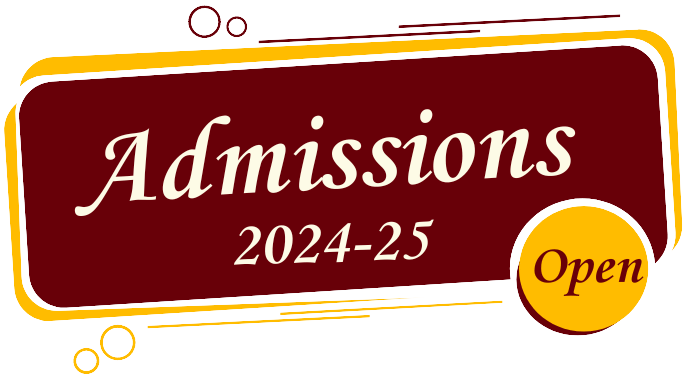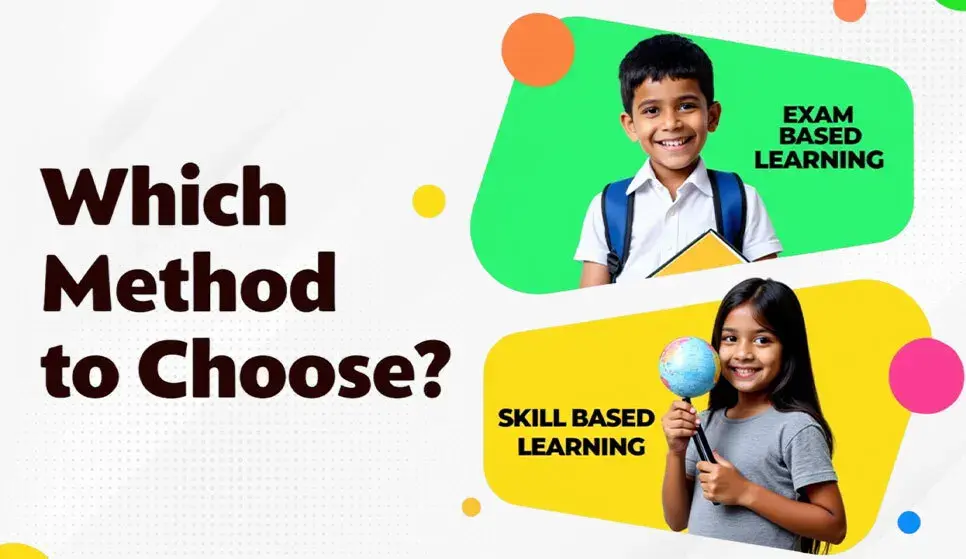Introduction:
In schools, the exam-based education system has been going on for the past 50 years. This system runs on the basis of a 10+2+3 structure.
The 10+2+3 system is a structure where students complete 10 years of schooling, followed by 2 years of high school, and then a 3-year undergraduate degree.
But over the past 10 years, the rise of skill-based systems started, which were based on learning skills and implementing them.
Then after many debates, the question arises, which one is better: Skill-Based or Exam-Based Learning.
In this blog, we will discover what Skill-Based and Exam-Based Learning are. The advantages and disadvantages, and which is best for your child.
Understanding Exam-Based Learning
Exam-based education is based on a structured learning of 15 years, where students complete 10 years of schooling, followed by 2 years of high school, and then a 3-year undergraduate degree.
It also includes graduation for another 2 years.
The East India Company introduced this education system to select suitable individuals for government positions within the colonial administration.
Understanding Skill-Based Learning
Skill-based education emphasises the ability to perform real-world tasks and adapt to different situations, often in the context of learning, training, and hiring.
This type of learning focuses on learning skills that can be immediately applied in a work setting or other real-world scenarios.
This education system was founded by John Dewey, which was then shaped by Paul Fitts, emphasising learning by doing, experiential learning, which are core tenets of skill-based learning.
The Historical Context of Exam-Oriented Education
This system started with informal oral assessments, which then evolved towards practical evaluation and written tests.
During colonial rule, education systems were often designed to produce clerks and administrators for the colonial bureaucracy. These systems emphasised rote memorisation, strict discipline, and standardised exams.
These evolved to select candidates for administrative roles, valuing test performance over practical ability.
Over time, many countries adopted this model for school and university admissions, reinforcing a system where passing exams became the central goal of education.
The Rise of Skill-Based Education in the Modern World
The rise of skill-based education is significantly influenced by the rapid evolution of technology and the shifting demands of the Indian job market.
As automation and artificial intelligence reshape industries, employers are increasingly valuing practical skills such as critical thinking, problem-solving, collaboration, and digital literacy.
Traditional rote learning and theoretical knowledge often fail to equip students with the adaptability required in such dynamic environments.
Consequently, educational institutions are now restructuring educational systems to prioritise real-world skills that match current and future job market needs, ensuring students remain relevant and employable.
Skill-based and exam-based learning differ fundamentally in their focus and approach.
Comparing Core Focus: Knowledge Retention vs Practical Application
Skill-based learning:
It emphasises the development of life skills such as critical thinking, creativity, collaboration, and adaptability. It encourages hands-on projects, real-world problem-solving, and interdisciplinary understanding.
Exam-based learning:
It prioritises the retention of theoretical knowledge, structured curriculum completion, and performance in standardised assessments. While the former nurtures independent and experiential learning, the latter often fosters discipline, consistency, and academic rigour.
Cognitive Development and Learning Styles
Cognitive Development:
This is the growth of a child's ability to think, reason, solve problems, and understand the world.
Skill-based learning often enhances cognitive flexibility, critical thinking, and creative reasoning. In contrast, exam-based learning may support memory development and structured thinking, but it can be limited in fostering deeper cognitive growth.
Learning Styles:
These are the different ways individuals absorb, process, and retain information, like visual, auditory, kinesthetic, or reading/writing preferences.
Skill-based learning accommodates a broader range of styles through interactive, hands-on projects and collaborative methods. In contrast, exam-based learning usually favours auditory and reading/writing styles due to its lecture and textbook-heavy structure.
Assessment Methods: Standardised Tests vs Performance-Based Evaluation
Standardised Tests:
Exam-based learning prioritises standardised tests by giving students exams at least three times a year to develop their learning abilities and grasp knowledge.
This puts a great emphasis on the student's mind, making them sharper and increasing their learning power. But exam-based learning often limits development to what fits inside the pages of a textbook.
Performance-Based Evaluation:
Skill-based learning prioritises performance. It provides students with real-life problem-solving skills, which makes them ready to encounter problems technically and logically.
It uses critical thinking and creative hands-on projects to make them sharper and innovative in their ways. But performance-based learning limits the technical understanding.
Real-World Preparedness and Employability
Both educational systems can help students get jobs and have healthy lifestyles. But which is better when it comes to real-world Preparedness and Employability?
Skill-based learning is better when it comes to real-world preparedness, but the value of a degree is still there in many countries, which makes exam-based systems also a priority.
The best thing would be to collaborate on both the learnings, creating a massive impact on the student's life. If the students get both skill-based and exam-based learning, they become ready for the real world while having great grasping power and excellent skills.
Hybrid Learning Models: The Best of Both Worlds?
It refers to educational models that combine elements of both skill-based learning and exam-based learning.
These approaches aim to merge the strengths of each system, offering the structure and academic rigour of exam-based formats alongside the flexibility, creativity, and real-world relevance of skill-based methods.
Blended models are increasingly being adopted in modern educational systems to meet diverse learner needs and better prepare students for both academic success and life beyond the classroom.
Which is Better for Your Child? Factors to Consider
While both systems have their advantages and disadvantages, which is well-suited for your child? These are some factors to consider while choosing:
Personality: Creative and mindful students may thrive with skill-based learning, while fast learners often perform well in exam-based systems.
Aspirations: A child aiming to work in emerging fields like AI or design may benefit more from skill-based learning. Those pursuing traditional careers like medicine or engineering may need exam-based pathways.
Strengths: Children with creative strengths can supplement with theoretical learning. Similarly, academically inclined children can explore their creative side, making a blended approach highly effective.
Conclusion
Skill-based and Exam-based Learning each offer unique benefits. Instead of choosing one over the other, the future lies in combining both to build a generation of well-rounded, capable individuals.
By aligning education with a child's strengths, goals, and learning preferences, parents and educators can better prepare them for success in school, at work, and in life.
Want both the learning's in your child's life? Contact us now to get admission to the best school in Rajound.


